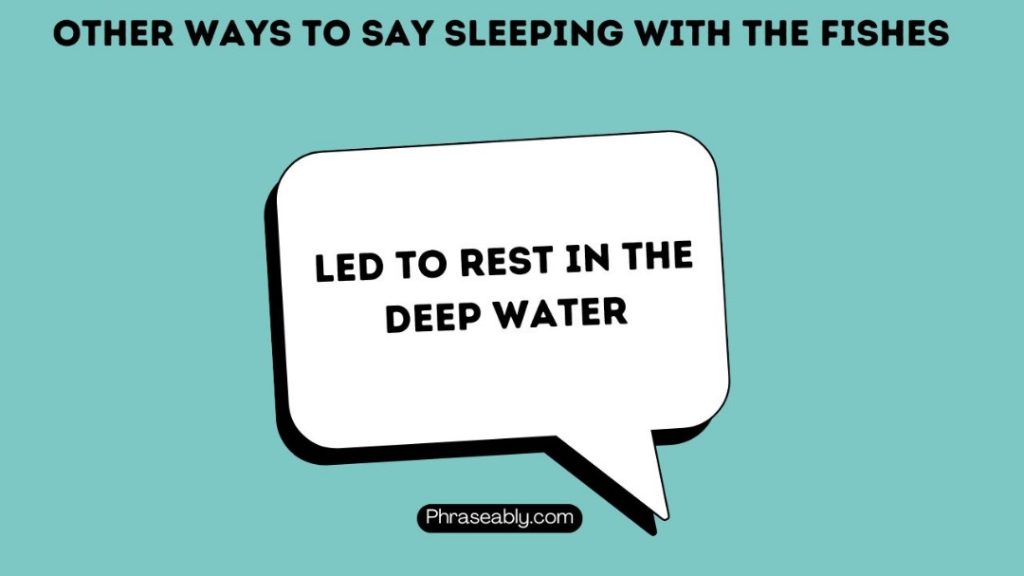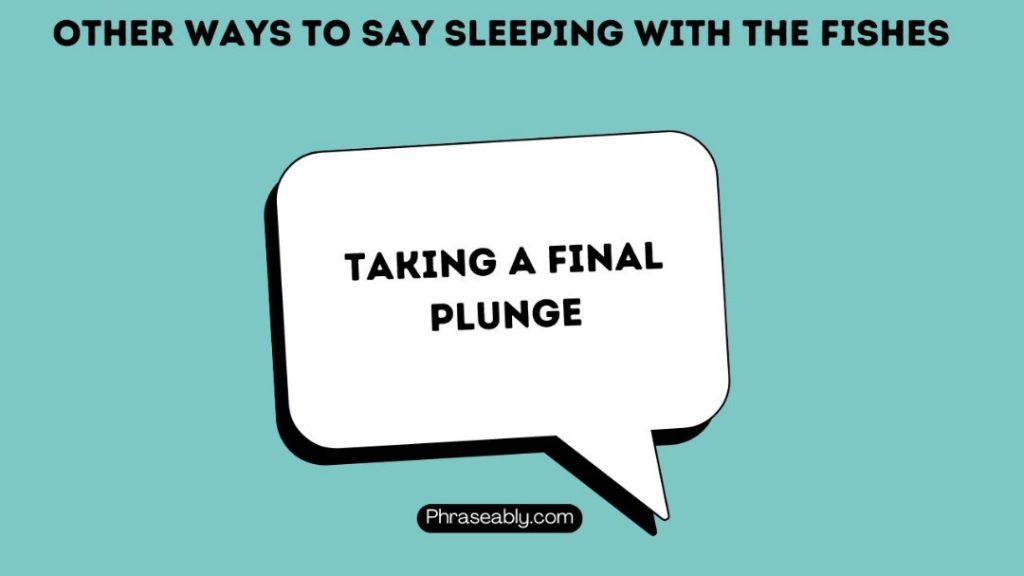Euphemism is a figure of speech that is used to say serious and delicate words in a mild way to reduce its effect.
An example of this figure of speech is ‘sleeping with the fishes’ which is a mild expression of a person being murdered or dead and their corpse being found in the sea or ocean.
You might find yourself in a situation as a cop/doctor/passerby and might be required to deliver the devastating news to the family or loved ones of the deceased, it could be tough but you can learn other ways to say that someone’s corpse has been found in the ocean.
Being equipped with this information will help you out in unfortunate circumstances.
In addition, it is vital to be sensitive in cases like this and maintain a serious demeanor so as not to look cold and heartless.
Alternative Ways to Say Sleeping With The Fishes
Here are other ways to utter in an eloquent and informative manner that a person is sleeping with the fishes.
- Led to rest in the deep water.
- Beneath the surface.
- Gone to the great ocean.
- Six feet under the sea.
- Gone fishing for a long time.
- Sinking into silence.
- Buried by the brine.
- In the ocean’s embrace.
- Missing in the tides.
- In the deepest end for eternity.
- Taking a permanent dive.
- Resting in the ocean’s bed.
- Buried in the blue sea.
- Drifting into the abyss.
- Resting with the sharks.
- Cradled by the current.
- Sunk beneath the waves.
- Taking a final plunge.
- Meeting Neptune.
- Reef-bound.
Led to rest in the deep water.

To say that someone has been led to rest in deep water is a figurative way of saying that someone died in the sea or their body was found there.
One of the best places to hide a dead body is in the ocean because that way, the deceased can not be easily found.
Be more sensitive in delivering the news or expressing that a person is dead at sea by using this phrase.
Examples:
- Sister Dorcas had been led to rest in deep water by the time the police arrived at the scene. What a tragic event that was for us all.
- I really wish she had not died that way. She was led to rest in the deep water.
Beneath the surface.
The simple definition of this phrase is that it means a corpse is being hidden or buried underwater, symbolizing death beneath the waves.
It conveys the idea that the person is no longer on the “surface” of life but has sunk below it, into the depths, which implies being dead and out of reach.
A mild way to communicate such tragic news can be through the usage of this expression as clearly seen in the example below.
Examples:
- Her body was discovered beneath the surface which made securing forensic evidence to nail her murderer difficult.
- We lost her beneath the surface, it was a tragic moment for us all.
Gone to the great ocean.
By referencing the “great ocean,” this phrase means a final journey to a vast, eternal place, where life and consciousness cease.
The expression implies death and disappearance amid the immensity of the ocean, conjuring images of the sea as a last resting place.
With the examples given, you will see how to make use of the phrase well.
Examples:
- I am sorry to say this to you but the man has gone to the great ocean.
- I don’t know how to say this but the man you’re looking for has gone to the great ocean.
Six feet under the sea.
“Six feet under,” a traditional euphemism for burial, is combined with the ocean in this expression. The expression helps to express that the person has died in the sea and has been buried underwater rather than in the ground.
If you ever find yourself in a situation that warrants using “sleeping with the fishes,” you can choose to say this way.
Examples:
- We found the woman six feet under the sea and we could not do anything about it at that point.
- I was shocked to hear that the body was found six feet under the sea.
Gone fishing for a long time.
The playful tone of “gone fishing” translates to someone who has gone away, but the addition of “for a long time” gives it a darker, more permanent meaning.
You are doing a great job being mild in saying that someone died. You are saying that the person is no longer coming back, they’ve been taken by the sea (death).
How this can be used in a sentence is given through the examples below.
Examples:
- Well, the sad news is that the man has gone fishing for a long time.
- There’s always a tragic incident that happens on the sixth of July, the last one was that a lady went fishing for a long time.
Sinking into silence.
This poetic phrase evokes the mental picture of someone sinking beneath the water into eternal silence.
This refers to both physical sinking (into the water) and metaphorical silence (death), which means that the person has passed away and is now lost to the world.
Despite how tragic the situation is, you can be more sensitive by choosing other ways to say the phrase “sleeping with the fishes.”
Examples:
- By the time I saw the little boy, he was sinking into silence. I could not bear to see such an horrific sight.
- Sinking into silence is what I was told that happened to the girl that night, is that true at all?
Buried by the brine.
“Brine” refers to salty seawater, and being “buried” by it sends the message that a person is being submerged by the ocean. This is another way of describing someone who has died and been discarded in the sea, with the water serving as their grave.
Examples:
- What happened is that the beautiful young lady that we met yesterday was buried by the brine last night.
- I heard what happened with Jane Doe, I heard that she was buried by the brine, what a pity.
In the ocean’s embrace.
‘In the ocean’s embrace’ is another phrase that uses the ocean as a metaphor for death, with the “embrace” which means that the sea has claimed the person.
In the phrase, the ocean is being portrayed as a final, eternal resting place, and that the person is now dead and lost in its depths.
There is always a need to be creative as much as possible to be able to come up with figurative phrases like this one.
Examples:
- By now, she has been in the embrace of the ocean for a very long time.
- I know that she is in the embrace of the ocean.
Missing in the tides.
What this phrase means is that the person has disappeared into the ocean, carried away by the tides.
A permanent loss, with the tides symbolizing the forces of nature that have taken the person away in death, all are the connotative meaning of the alternative phrase.
Examples:
- When I went to see the crime scene, I realized that it was the girl that was missing the tides.
- I am devastated that the person is now missing the tides.
In the deepest end for eternity.
“The deepest end” makes reference to the deepest part of the ocean, representing both depth and finality.
By adding “for eternity,” the phrase comes together to translate that the person is permanently lost in the ocean, which proves the point that death is a deep and unreachable place.
Examples:
- The person swam to the deepest end of eternity, may he or she continue to live on in our lives.
- There is a need to express my condolences, she went to the deepest end of eternity.
Taking a permanent dive.

Another phrase that can alternate for ‘sleeping with the fishes’ is ‘taking a permanent dive.’ In this statement, death is stood for by a final, irrevocable act of plunging into the water.
Since the word “permanent” implies that there is no way out, it is a metaphor for being permanently enmeshed, much like “sleeping with the fishes.”
Examples:
- I didn’t know that after she left me, you would go to take a permanent dive.
- I guess that she went to take a permanent dive.
Resting in the ocean’s bed.
“Resting” in this context means eternal peace, and the “ocean’s bed” refers to the sea floor, where one is laid to rest after death. This aligns with the idea of being underwater permanently, like a body sunk in the ocean.
Examples:
- I hope that she is resting in the ocean’s bed now that she is no longer with us.
- The person is now resting in the ocean’s bed.
Buried in the blue sea.
Also, this statement shows a form of burial at sea, with “blue sea” emphasizing the vastness of the ocean. The person is now part of the deep, akin to being lost or hidden in the waters, much like a body dumped in the ocean.
Examples:
- With the way we found the body, we know that the man was buried in the blue sea.
- She wasn’t buried in any places other than the blue sea.
Drifting into the abyss.
“Abyss” conjures a gloomy, limitless depth, while “drifting” conjures the idea of a corpse floating away in an uncontrollable manner. Similar to the idea of dying under the sea, this term means being dragged away into the unknown depths of the sea.
Example:
- I wish that I had done something to stop her from drifting into the abyss.
Resting with the sharks.
Sharks are often associated with the dangerous, predatory aspects of the ocean. To “rest with the sharks” is one subtle way of saying being in the realm of predators, possibly after death, much like a body lost at sea in shark-infested waters.
Example:
- I dreamt that you were resting with the shark.
- Please, how do I react to the news that someone is resting with the shark.
Cradled by the current.
The “current” represents the natural movement of the ocean, and “cradled” means to be gently held or carried.
This point bts at the idea of the ocean itself keeping the body in its embrace, much like a final resting place beneath the water.
Example:
- Well, I don’t have anything left to say other than Cradled by the current.
Sunk beneath the waves.
In addition, “sunk” means going down into the depths, while “beneath the waves” refers to being submerged underwater.
This phrase informs the person of a body that has sunk into the ocean and is now resting there, much like someone “sleeping with the fishes.”
Example:
- I hope that she lives on despite the fact that Micheal sunk beneath the waves.
Taking a final plunge.

An irreversible, final plunge into the water is referred to as a “final plunge” and represents death. The expression “sleeping with the fishes” is a clear metaphor for going into the water for the final time, after being killed or dying.
Example:
- We gather here today for the memorial of our dear sister who took her final plunge after a month of being sober.
Meeting Neptune.
Neptune, the Roman god of the sea, is a good fit to make reference to the ocean and its powers. To “meet Neptune” is intrigued entering his domain, the ocean, in death, implying that one’s body is now part of the sea.
Example:
- They went to meet Neptune, I am so sad to be the one to say it.
Reef-bound.
According to this, a body will eventually arrive at a reef and rest there, akin to someone who has been sent to “sleep with the fishes.”
There is a certain way you can always make use of phrases, all you have to do is to read this article to get started.
Example:
- She has been reef bound the whole period we were looking for her.

